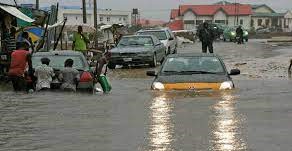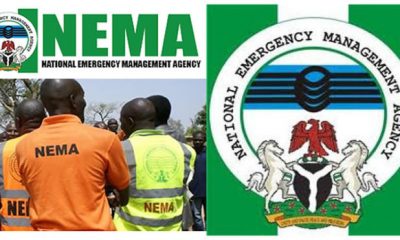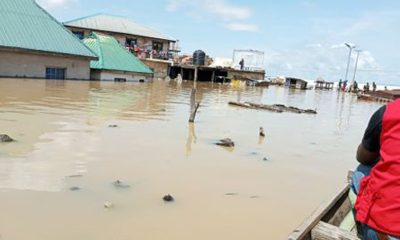NEWS
Flood Kills Eight, Destroys N180m Property in Bauchi

From Mohammed Muktar Umar Bauchi
Bauchi State Emergency Management Agency (SEMA) has revealed that property, including houses in 57 villages across 11 local government areas of the state, farmlands and livestock, worth N180million have been destroyed by floods in which eight lives were loss so far in the state.
This was disclosed by the SEMA Coordinator, Dr Abubakar Umar Gabarin, who revealed that 567 people were affected by flooding, adding that three people died in Ningi, three died in Gamawa and one person each in Jama’are and Toro Local Government Areas respectively.
According to the SEMA coordinator, the figures were only tentative as the Agency was still counting, adding that it would submit an interim report to the state governor, Senator Bala Mohammed, to enable the state government to assist the victims.
Also speaking, Director, Research and Statistics of the agency, Adamu Nayola, warned people living in flood plains and waterways across the state to relocate as the peak of rains is yet to come in order to avoid disastrous effects of floods.
He also warned people to avoid swimming in rivers whenever they see heavy downpour, saying that, “they don’t know what the rivers bring along. Sometimes, it comes with sharp objects that will injure and kill people.”
Nayola lamented that majority of flood victims are regular victims who are being affected by flood annually as a result of their refusal to vacate flood plains and riverine areas where many of them live in weak buildings.
He blamed flooding on natural disasters and poor drainage systems caused by uncontrolled physical development in parts of the state.
“You can see the results. Besides the high number of casualties recorded, many houses were washed away, while others collapsed. Several farmlands were submerged just as foodstuffs and livestock were also lost to floods,” he lamented.
In another development, Governor Mohammed has directed the state Ministries of Land and Housing to demolish buildings on waterways at the Unguwar Yankari behind the Department of State Services (DSS) in Bauchi.
The governor gave the directive when he visited the area to assess the havoc wrecked by flooding in the area, adding that the people who buildings are to be demolished should be compensated properly.
According to him, the demolition was inevitable as it was the only way to solve the perennial flooding in the area.
NEWS
Eight Students Die, Three Injure in Jos Road Crash

From Jude Dangwam, Jos
The Vice Chancellor of the University of Jos, Prof. Ishaya Tanko has confirmed the sad death of 8 students of the University to a road crash involving their Toyota bus with a truck in the metropolitan city of Jos.
He disclosed that one of the students was being prepared for surgery in the early hours of Thursday at the Jos University Teaching Hospital while others were receiving medication at the Bingham Teaching Hospital.
The Federal Road Safety Corps (FRSC) Plateau State Command disclosed that the accident occurred opposite Unity Bank Zaria Road, Jos, at around 2:30 am.
The Plateau State Sector Commander of the Corps, Olajide Mogaji explained that seven people lost their lives on the spot, while another victim died in hospital, bringing the total number of fatalities to eight.
According to the Command’s statement, the crash involved a trailer and a bus, which was carrying eleven passengers, all male students of the University of Jos, opposite Unity Bank Zaria Road, Jos, at around 2:30 am.
Mogaji said eyewitness accounts revealed to the corps emergency teams that the bus was speeding and engaged in wrongful overtaking, leading to the loss of control and the crash.
The Sector Commander has appealed to drivers to avoid night trips, excessive speed, and dangerous driving, saying, “The government needs you alive, and wants you to live life to the fullest in this festive season and beyond.”
The FRSC noted that the incident is still under investigation, while urging the public to report crashes or road emergencies to their toll-free emergency number 122 at all times for prompt responses.
The victims were said to have been coming back from a welcome special party for new students when the unfortunate incident occurred with the vehicle carrying the male students while the other vehicle carrying the female students escaped the tragedy.

UNICEF Hails Bayelsa as Champion of Primary Healthcare Devt in Nigeria
From Mike Tayese, Yenagoa
The United Nations Children’s Fund (UNICEF) has commended the Bayelsa State Government for its deliberate efforts at improving primary healthcare delivery, especially in the area of immunization in recent years.
The Country Representative of UNICEF in Nigeria, Wafaa Saeed, gave the commendation, on Wednesday, when she led a delegation on a courtesy visit to Government House, Yenagoa.
Saeed said what she saw during her visit to some health facilities and her random interactions with some mothers in the state, corroborated the positive reports UNICEF has been receiving about Bayelsa in terms of immunization.
The special UN envoy, who described Bayelsa as champion of healthcare delivery and a shining spot in the country, noted that the state has achieved an impressive performance in its immunization indices from 2021 to date.
She attributed the improvement in the health indicators of the state to purposeful leadership, commitment and accountability being provided by the present administration.
While assuring the Bayelsa of UNICEF’s readiness for collaboration to improve nutrition for children as well as unlock resources for healthcare development in the state, the Country Rep, however, urged the Governor Douye Diri-led administration to sustain its efforts in the health sector.
She said, “We are really impressed with what Bayelsa is doing… Bayelsa State has also committed its financing of immunization campaigns from the state budget, and a special one (immunization) in-between.
“Also there is a monthly allowance and support you have continued to give from GAVI. These are some of the things that have really increased the number of immunized children and improved the performance of the state.
“In 2021, the number of children not immunized in Bayelsa was 71 percent; that means seven out of ten kids were not immunized. But between then and now, there is a big difference due to the leadership, commitment and accountability we are seeing in Bayelsa State.
“You have been a champion of primary healthcare and a champion of immunization. And I really look to have Bayelsa not only a champion of states in Nigeria but in our continent and the globe.”
In a response, Governor Douye Diri represented by his deputy, Senator Lawrence Ewhrudjakpo, reaffirmed the determination of his administration to prioritize investments in the health sector.
He said plans were underway to review the state primary healthcare board law with a view to not only sustaining the extant primary healthcare funding model but also expanding it through effective private sector contributions, especially from corporate organizations operating in the state.
Diri thanked the Country Rep, Ms Wafaa Saeed, for her kind words of encouragement and also acknowledged the support of UNICEF, WHO, Bill Gate, Dangote Foundation and other development partners, noting that Bayelsa could not have recorded its present achievements in the health sector without their collaboration.
His words: “We also want to thank you profusely for supporting our programme. We thank UNICEF, the WHO, Bill Gate Foundation, Dangote Foundation and others for your support. We really appreciate what you have done for our state.
“As a government, we know where we are going. A man who knows where he is going cannot be misled. We are focused and will continue to redouble our efforts in the health sector.
“You talked about sustainability. That is very important to us, and so, we are looking at the principal law, which is the Primary Healthcare Development Board Law. We are looking at some areas of that law to bind the hands of whoever that comes after us.
“That is to ensure that even if the administration after us will not have the motivation and passion to provide leadership for primary healthcare like the present governor is doing, the law will compel them to do so.”
The UNICEF Country Representative was accompanied on the visit by the Chief of Field Service, Judith Leville, UNICEF Health Consultant, Dr. Makio Perekeme, the Chief Field Officer, Anselm Audu and a health specialist, Eghe Abe, among others.

Mutfwang Pledges Support for Minister of Defence in Fight against Insecurity
From Jude Dangwam, Jos
Plateau State Governor, Caleb Mutfwang, has paid a courtesy visit to the newly appointed Minister of Defence, Gen. Christopher Gwabin Musa (Rtd), assuring him of his total and unwavering support in the collective effort to defeat insecurity in Plateau State and across Nigeria.
The Director of Press and Public Affairs to the Governor, Gyang Bere on Thursday disclosed that the Governor has expressed delight over Gen.
Musa’s appointment, describing it as a “strategic and timely decision” in confronting the country’s intricate and evolving security challenges.Mutfwang noted that the Minister’s vast experience and proven professionalism would significantly strengthen ongoing national security interventions.
“We must now focus on finding solutions to the challenges confronting us. Whatever has happened in the past should not deter us. The time has come for all of us to join hands and holistically address our security concerns,” Mutfwang emphasized.
The Governor reiterated his support for the establishment of State Police, acknowledging concerns about possible abuses, but stressing that the nation must collectively develop safeguards and ensure operational efficiency.
Gen. Christopher Musa expressed gratitude for the Governor’s visit, assuring him of a robust and productive collaboration in addressing security concerns in Plateau State and the country at large.
He commended Governor Mutfwang for hosting the Plateau Unity Christmas Carols and Praise Festival, describing it as a unifying initiative.
































